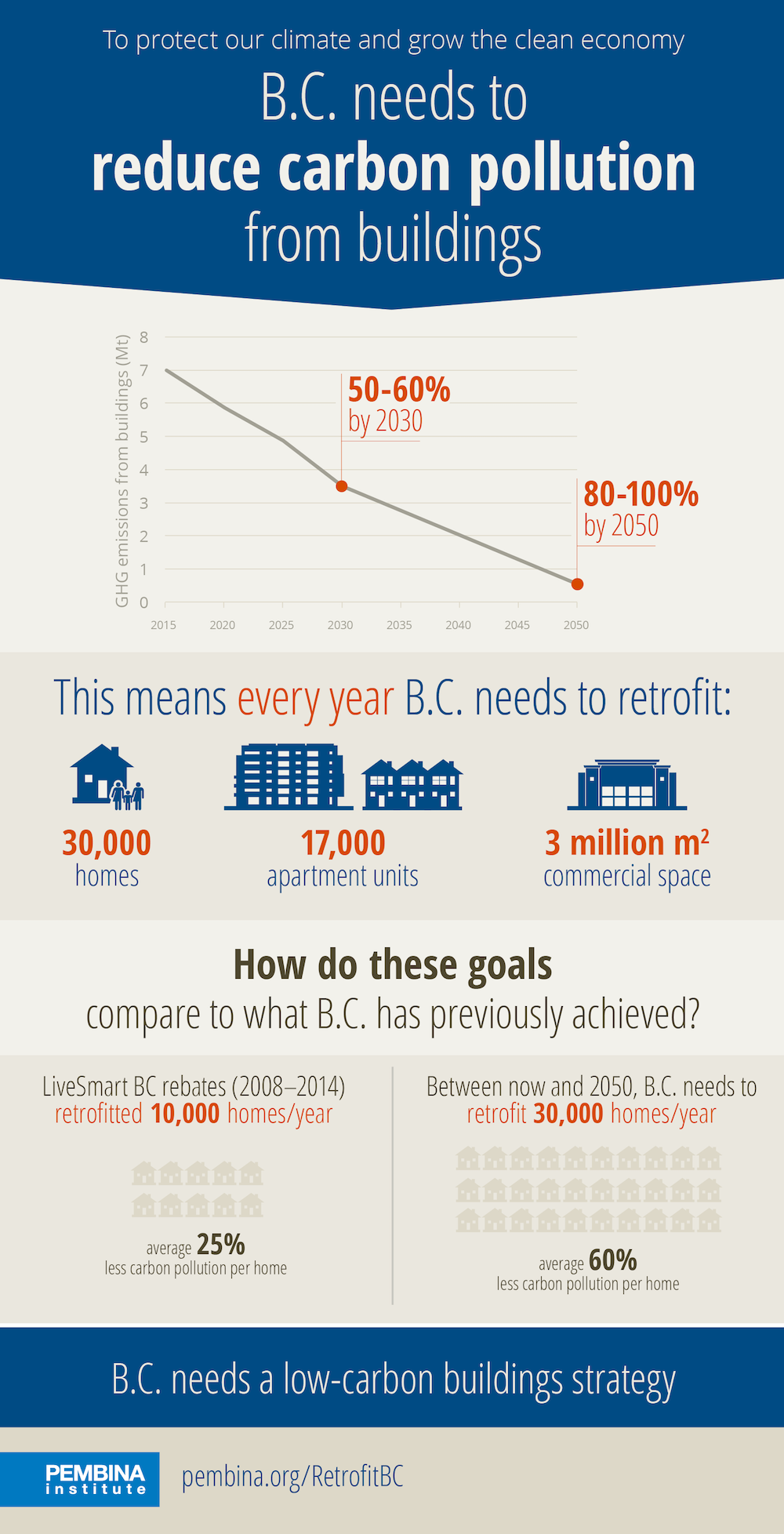VANCOUVER / MUSQUEAM, SQUAMISH & TSLEIL-WAUTUTH TERRITORIES — British Columbia’s government has taken another step towards regaining climate leadership with strong policy proposals in its first three intentions papers on clean growth. However, further bold actions must be forthcoming for B.C. to effectively curb climate-damaging carbon pollution and accelerate the transition to a low-carbon economy.
The Pembina Institute has submitted dozens of recommendations in response to the intentions papers on Clean, Efficient Buildings and A Clean Growth Program for Industry. On Friday, August 24, the public consultation period for the papers (including a third one on Clean Transportation) comes to an end.
B.C. should set a target for carbon pollution from homes and buildings to be reduced by 50% to 60% by 2030, as suggested by the government’s Climate Leadership Team and Climate Solutions and Clean Growth Advisory Council. Carbon pollution from buildings should also be virtually eliminated by 2050. To meet these goals, the province must ensure new buildings are energy-efficient and heated by low-carbon fuels, such as renewable electricity, renewable natural gas, or renewable district energy systems.
B.C. also needs a low-carbon retrofit strategy — to upgrade 30,000 houses, 17,000 apartment units, and 3 million square feet of commercial space every year between now and 2050. Making our homes and workplaces energy-efficient, healthy, safe, and affordable is the next mega-project for B.C. — one that calls for private and public investment of up to $1 billion per year.
The Pembina Institute is generally supportive of the proposed Clean Growth Program for Industry, which would maintain the incentive to reduce carbon pollution. Our recommendations are aimed at ensuring the policy is simple, temporary, and transparent. Addressing industry concerns about carbon pollution pricing and competitiveness will help prevent emissions leakage, alleviate a barrier to further carbon price increases, and secure a strong economy for B.C.
The B.C. government is expected to release its clean growth strategy this fall. Successful implementation will require carbon budgeting by sector and robust accountability mechanisms.
Quick facts
- B.C.’s carbon pollution in 2015: 62 million tonnes (Mt)
- Legislated targets: 40 Mt by 2030, 27 Mt by 2040, 13 Mt by 2050
- Carbon pollution by sector: Industry (41 per cent), transportation (39 per cent), buildings (17 per cent)
Quotes
“The task of reducing B.C.’s carbon pollution must not be underestimated. With B.C.’s climate action having stalled in recent years, we must be ambitious to make up for lost time. British Columbians deserve a forward-thinking clean growth strategy that will accelerate the transition to low-carbon energy, curb carbon pollution, and secure economic prosperity.”
— Karen Tam Wu, B.C. managing director, Pembina Institute (and member, Climate Solutions and Clean Growth Advisory Council)
[30]
Download the submissions: pembina.org/pub/bc-clean-growth-intentions
Find photos for editorial use: flickr.com/pembina
Join the conversation on Twitter: #CleanGrowthBC @Pembina
Contact
Stephen Hui
Communications Lead, Pembina Institute
778-987-7654
stephenh@pembina.org
Tw: @StephenHui
Background
Webinar: Setting intentions for B.C.'s next climate strategy
Webinar: Making low-carbon buildings the new normal in B.C.
Op-ed: B.C. can lead next wave of Canadian climate action
Infographic: B.C. needs a low-carbon buildings strategy
About the Pembina Institute
The Pembina Institute is a non-profit think-tank that advocates for strong, effective policies to support Canada’s clean energy transition. We have offices in Vancouver, Calgary, Edmonton, Toronto, and Ottawa. Learn more: www.pembina.org





